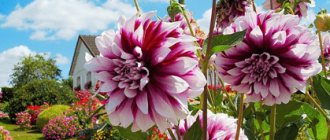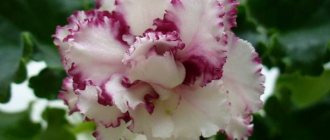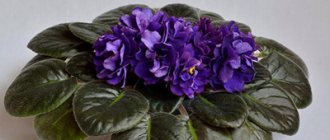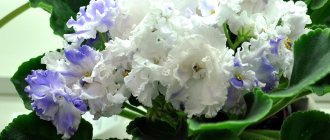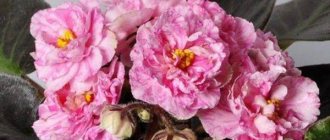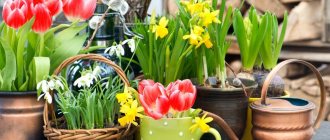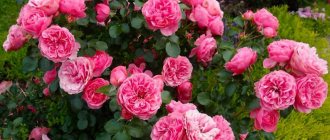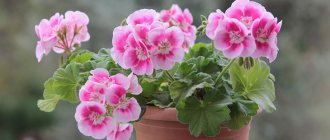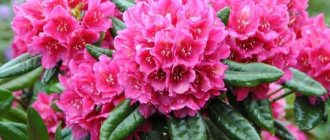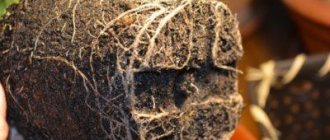Pelargonium sharon louise
MINIATURES AND Dwarfs (ZONAL) 1.Annsbrook Peacher - Miniature zonal pelargonium.
The flowers are double, large, pink-peach in color. 2. 3.Brookside Flamenko - Zonal dwarf pelargonium. 4. 5.Brookside Miranda 6.Just Joss - Zonal dwarf pelargonium in a bright burgundy red hue. There is a small white eye in the center of the petals. 7. "Sarah Hunt" - Miniature zonal pelargonium. The flowers are salmon pink interspersed with white, semi-double, large. 8.Davina – Miniature zonal pelargonium. Large double flowers of coral-salmon color, with veining. 9. Michele West - miniature zonal pelargonium. The bush is compact. The flowers are elegant, double in pink and white. The petals are wavy, as if twisted. It is formed independently. . 10.Calipso - Zonal pelargonium with large, semi-double flowers of lavender-lilac color. The bush is compact. 11.Ingrid Grycksbo – dwarf zonal pelargonium. 1. 1.Red Pandora' – tulip-shaped pelargonium. Coral red flowers in the shape of a tulip. Beautiful velvet leaves of a special shape. 300 rub. 2.Marie Louise – Tulip-shaped pelargonium with stunning pink and white flowers, the petals are slightly ruffled at the edges. 350 rub. 3.Marbacka Tulpan - Tulip-shaped pelargonium. Light pink, almost white flowers in the shape of a tulip. 350 rub. 4.Linea Andrea - Tulip-shaped pelargonium, lilac color. 350 rub. 5.Lilian andrea - Tulip-shaped pelargonium with large caps of bright burgundy color. 350 rub. 6.Carmen Andrea - tulip-shaped pelargonium. The flowers are bright, semi-double. 350 rub. 7. Victoria Andrea – tulip-shaped pelargonium. Large burgundy-red flowers with “spraying”. The bush is stocky and compact. 350 rub. 8. Emma fran Bengtsbo – tulip pelargonium. Flowers in the shape of an unopened tulip with pale pink petals. The foliage is glossy with a slightly curled edge. The bush requires attention when forming. 350 rub. 9. 'Pink Pandora' - Zonal tulip pelargonium 10. PAC Happy Birthday - tulip pelargonium. Large lilac-pink flowers.
Pelargonium ivy-leaved
Pelargonium ivy belongs to the Geraniaceae family; among ordinary flower lovers it is better known as “geranium”. In some editions the name “thyroid pelargonium” appears.
Pelargonium is familiar to every gardener
The birthplace of the flower is South Africa. The name of the plant comes from the word “pelargos”, which means crane in Greek. Indeed, the pistil style, which has grown in length after pollination, resembles the beak of a crane.
Description of appearance
This is a perennial plant with large leaves of rich green color and umbels of flowers of various shapes and colors.
Unlike other species, ivy-leaved pelargonium has creeping shoots, and the leaves do not have the pubescence characteristic of this genus. The shoots hang down as they grow and the plant takes on an ampelous appearance.
The flowers are collected in inflorescences - umbrellas with long pedicels. The variety of varieties of this plant implies a large number of variations in color and shape of flowers. They can be purple, white or even variegated, such as pelargonium roulette.
For reference! The shape of the flowers is regular, semi-double and double.
Description and characteristics of cultivation
Interestingly, among all the variety of varieties, it is dwarf geranium that is becoming increasingly popular. It has many advantages. For example, such a plant will take its rightful place on the windowsill and fit perfectly into any of your flower collections.
It is grown in a compact pot, since the flower is very miniature. Nevertheless, its small dimensions do not prevent it from blooming magnificently. Another important advantage of this group of geraniums is that formative pruning of such a flower specimen is not necessary at all.
Caring for dwarf pelargonium varieties at home is not too labor-intensive; even a beginner can handle it. However, take some recommendations into account so as not to harm your indoor flowers. For example, like most geraniums, dwarf pelargonium does not like waterlogged soil - it will cause the rhizome to rot before you even blink an eye. That's why remember two things:
- The plant substrate should be moistened in moderation;
- The soil must contain sand or vermiculite. Such components are useful because they absorb excess moisture, and you do not have to correct the consequences of waterlogging the soil.
You will certainly be able to care for low-growing varieties of pelargonium. Over time, many gardeners begin to expand their collection of dwarf geraniums. This can be done easily and at home, no extra costs will be required.
How are these flowers propagated? It is best to start this procedure at the end of February or early March. It is during this period that the plant gradually comes to its senses after wintering, and its vital processes are activated. First of all, cut the cutting with two internodes, and then dry it thoroughly.
The next stage is planting in nutrient soil. It is not recommended to cover the top of the cutting with glass or film - this will only create an excessively humid environment for the geranium, which can have a detrimental effect on it. Miniature cuttings of pelargonium will very quickly take root in a new place. The main thing is to place the pot with the shoots in a well-lit place. Under favorable conditions, within a month you will receive a fully rooted plant.
Pelargonium ivy - home care
Pelargonium April Snow - growing geraniums
To ensure that pelargonium blooms lushly and leaves and shoots are healthy, you need to properly care for this flower. There are certain growing conditions and rules for caring for this plant.
| Light | This African beauty prefers sunny windowsills, preferably facing south. When planting in open ground for the summer, it is better to choose a place in partial shade or illuminated in the first half of the day. |
| Temperature | In summer, the flower feels great at a temperature of 19-23 degrees. In winter, it is better to reduce these indicators by 4-6 degrees. |
| Watering | In summer, during flowering, it is necessary to water regularly and abundantly. Care should be taken to avoid getting moisture on the leaves when watering. Excess water from the pan should be removed. |
| Humidity | Normal room conditions are quite suitable for pelargonium. It does not need spraying; it is destructive for this flower. |
| Feeding | During the period of active growth and flowering, it is necessary to regularly fertilize. You can purchase ready-made fertilizer for pelargoniums at the garden center. In winter, fertilizing is stopped. |
| The soil | You need nutritious soil that conducts air and moisture well. Ready-made soil containing peat and nutrients is ideal. |
| Container size | The root system of pelargonium is very developed. The tendency to rapid growth concerns not only the vegetative part, but also the roots. The pot should be several centimeters in diameter larger than the volume of the root system. |
| Trimming | To stimulate branching of shoots, pinch the tops. This allows you to achieve greater bushiness and thickening. It is also necessary to remove faded inflorescences to activate the formation of new ones. |
| Transfer | The plant needs regular replanting. It is necessary due to the growth of the root system and soil depletion. Replanting is carried out with a complete replacement of the soil into a larger container. |
Ivy geranium responds very well to planting in open ground for the summer. Care and reproduction in such conditions remains the same as in indoor conditions. Unless it is necessary to reduce watering if rain is forecast or has occurred.
Pelargonium grows well outdoors
Attention! Pots with pelargonium should be brought indoors before the temperature at night drops to 10-12 degrees. Otherwise, the acclimatization process will be painful and long.
The best varieties
There are more and more new varieties of pelargonium. That is why it is worth considering the most remarkable specimens. Only this way can you make an informed choice and purchase plants that will certainly decorate your home. Among the popular dwarf species of pelargonium, the following varieties are distinguished:
- pelargonium variety Jinky. The advantage of this plant is considered to be large double flowers of a light creamy color. At the same time, at the very core, the petals acquire a rich pink color. This plant is very tender and airy, its foliage is characterized by the presence of a light green tint;
- pelargonium variety Pink Ice. This dwarf bush is quite stocky and branchy for its small size. Its petals are elongated, double, and have a soft pink tint;
- pelargonium variety Clatterbridge. This plant belongs to the group of zonal dwarf geraniums. This shrub is also miniature in size, but blooms intensely. Its flowers are double, bright red;
- Silk Moira. This pelargonium has salmon-colored flowers. This plant is not picky in its care, and it is not difficult to form;
- Madame Maleron. If all previous varieties of pelargonium were distinguished by the presence of bright inflorescences, then this variety does not bloom at all. Its main advantage is its beautiful dark green leaves with a light border;
- Pac Harmony. The flowers of this plant are quite large, semi-double, and have a rich pink color;
- Only Joss. The key advantage of this specimen is the presence of bright, berry-red flowers. There is a slight light inclusion in the center of the bud;
- Deacon Santan. The shrub grows quite compact. However, large bright orange flowers will not leave anyone indifferent;
- Dylan Sharon. What is notable about this dwarf geranium is the presence of dots on the petals of the plant. In addition, such geranium blooms quite intensively;
- Marie-Louise. This dwarf flower is often called a tulip. And all because its buds do not open completely during flowering. The shade of the plant’s petals is very beautiful - soft peach with a transition to creamy;
- Diana Palmer. Another mini-shrub, ready to delight you with intense flowering. The shape of its petals resembles a carnation.
Flower passion.
I love all living plants. I see a highlight in each of them. But my strongest flower passion in recent years has been pelargoniums.
Dear readers, at the moment I have a small but amazingly beautiful collection of unusually blooming pelargoniums. I have “Rosebud” - pelargoniums blooming with roses, Tulip - blooming with tulips, asters, carnations, one variety - peonies. There are several fragrant varieties, with the scent of rose, lemon, wormwood, peach, and apple. And I want to share all this wealth with you.
Description of the species
Ivy-leaved pelargonium “arrived” to us from South Africa. Its numerous varieties are now common on many continents and are highly respected by flower growers. If the flower is planted in a flowerpot, it can be used as decoration for loggias and balconies.
The plant owes its name to its five-lobed leathery leaves, which are very similar to ivy foliage. Pelargonium of this species has very strong shoots - they can cling to rocky ledges and climb up, thus ensuring the sowing of their seeds. The stem can reach a length of 1 m.
The inflorescences of the crop are shaped like umbrellas and contain from 6 to 15 flowers. The plant can have both plain flowers and those decorated with spots, stripes and even a border.
Sharon Louise
ATTENTION!
Sending by train is possible to all cities if there is a direct connection from Tyumen to your city!
Year-round delivery of orders to the following cities:
Astrakhan, Baku, Vladivostok, Vladimir, Volgograd, Vyazma, Yekaterinburg, Irkutsk, Ishim, Kazan, Kamensk-Uralsky, Kemerovo, Kirov, Krasnoyarsk, Makhachkala, Megion, Miass, Minsk, Moscow, Nizhnevartovsk, Nizhny Novgorod, Novosibirsk, Omsk, Penza , Pervouralsk, Perm, Rostov, Samara, St. Petersburg, Saratov, Smolensk, Sochi, Surgut, Syzran, Tobolsk, Tomsk, Ulan-Ude, Ulyanovsk, Ufa, Khabarovsk, Chapaevsk, Chelyabinsk, Chita.
NEW Baby sets on sale:
Violets - 10 children at a price of 1400 rubles. together with postage (without postage 1000 rub.).
Pelargoniums - 5 pieces 1000 rub. (without postage)
In the sets, children are selected at my discretion, different in color.
Rating of top blogs on the Runet
Yablor.ru
— rating of Runet blogs, automatically sorted by the number of visitors, links and comments.
Phototop is an alternative representation of the top posts, ranked by the number of images. The video top contains all the videos found in bloggers' current posts. Top of the week and top of the month represent a ranking of the most popular posts in the blogosphere for a specified period.
The rating section contains statistics on all bloggers and communities included in the main top. The rating of bloggers is calculated based on the number of posts that reached the top, the time the post was in the top and the position it occupied.
